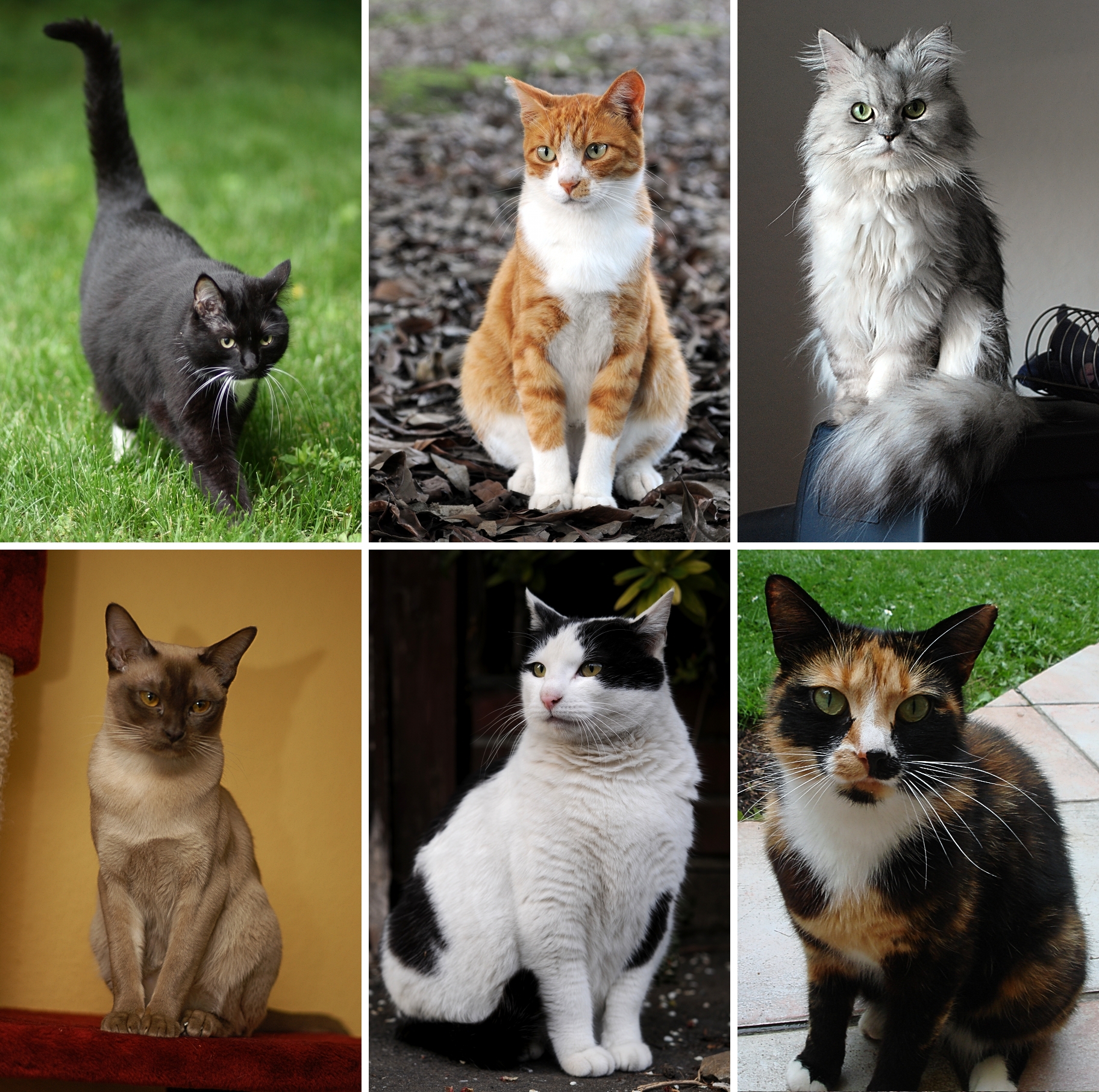It truly is a different beast from Britannica. For example, if you go to the page on cats, you’ll see this pleasant montage of demonstration photos:
When I view the discussion, however, I get the added interesting benefit of the long discussion about what sort of photos should be included in this image: Kittens? Hairless cats, or ones with curly, wiry fur? Why six images instead of one? Apparently, this is especially contentious – the dog article only has one. I also learn that this current image replaces one in which four out of the six images was of a tabby cat, and can view other images that were up for consideration, and much, much more.
Here's the image that was present at the beginning of September 6th, 2009:
And this doesn’t even get into “View History”. Just what I need! Another time sink hole...
I wonder what patterns in negotiation appear over time, and across a wide range of pages? It would be very interesting to analyze common themes among those details that people discuss and edit the most. What types of knowledge do we have the hardest time navigating?
For now though, I’ll zoom in on one particular aspect of this process that I find especially amazing, and awesome; an aspect that the book hints at, but (I think) never expressly states. (Correct me if I’m wrong – I made the mistake of reading the rest of Weinberger around Wednesday, and waiting till now to respond...) At least on a massive scale such as Reddit or Wikipedia, constructing knowledge in this way seems to remove the risk of groupthink to a very significant degree. For example, check out these epic edit wars.
It seems that, no matter how seemingly inconsequential a detail may be, someone out there is willing to continue working for the acceptance of their own view. This makes a lot of sense, as I think about it more. I think this is true for many reasons: people don’t have to meet at set times to discuss issues, and can pick up the same conversation at different points over the course of weeks if they desire; while there are usually administrators at sites such as these, they don’t hold the same power as in other typical hierarchies; people aren’t meeting face to face. While we often hear about the negative elements of the last reason in the media: flaming, trolling, etc. I think there’s a positive side to this as well. Just as we’ve talked about in relation to students who may be silent in class but active and compelling on discussion boards.
The question for me now is: How much does this element carry over into smaller communities? Based on the classroom example I just mentioned, I think that it definitely does carry over at least to some degree. But how does knowing that an instructor will be reading everything they write change the knowledge making process? Also, what happens in business situations? As Weinberger comments, “Businesses have long suffered from a similar disconnect. Businesses want their employees to be as smart and well informed as possible, but most are structured to reward individuals for being smarter and better informed than others” (145). (This is true in the traditional classroom to a good degree as well...) For example, Weinberger states soon after the above quote that the CIA now incorporates blogs, and a wiki with 5000 articles into the process that leads to the final reports compiled by intelligence analysts. How do you think these blogs and wiki pages differ from those created on sites like Wikipedia?



Sarah, great post! From what I've read, we were all struck hard by chapter 7 and its revelations regarding Wikipedia. I, for one, didn't even think much about the classroom (shame on me) but went right to the implications this has for our government. It is not often that we see a cacophony of voices turn out a good product. This is an amazing thing! Disparate groups working together toward an actual product? Wow!
ReplyDeleteI really hadn't thought about how the discussions on Wikipedia don't become "groupthink". One of my favorite parts of school is the classroom discussion because so many points that I hadn't even thought of get brought up and it really pushes my own thought further. I never really had a concern about "groupthink" because I was only worried about my own mental progress, but, yes, classrooms often come to some agreement that might not really be an agreement at all, but just assimilation. And how DOES the teacher's presence affect the discussion? Well, some people might be afraid to really say what they think because they don't want to sound dumb or they want to say what they feel the teacher wants to hear. That doesn't exist in Wikipedia. And yet online class discussions aren't absent of those issues, so what is it about Wikipedia that makes it such a great place for this type of standing up for what you believe and arguing responsibly for your point??? Is it the anonymity??? Is it that being there and doing that is a choice???
ReplyDeleteI've actually used a wikispace with my 8th grade Reading classroom before as an alternative format for their reading logs and it was successful in ways that the traditional paper logs, charting the pages they've read and their response to the reading, were not. Unlike their paper predecessors requiring a parent signature, these wiki-logs required participation in the discussion tab. (I set up the wiki so there was only one for the entire site, not one per page). I was thrilled to see that while most discussion posts were superficial, it brought an element in to the classroom that hadn't existed before: students were actively sharing what books they were reading with each other, creating a community of readers. AND since we only had one wikispace for all 5 periods, they were communicating with peers outside of their own classroom. Pretty cool.
ReplyDeleteStill, there is so much more than can be done with wikis and certainly so much more that could have been done to enhance the class wiki that my mentor teacher and I used with our students. For us, it was enough that the discourse about reading was brought outside of the constraints of the classroom, but what would it have been like if they had started to go beyond their reading logs and build knowledge together?